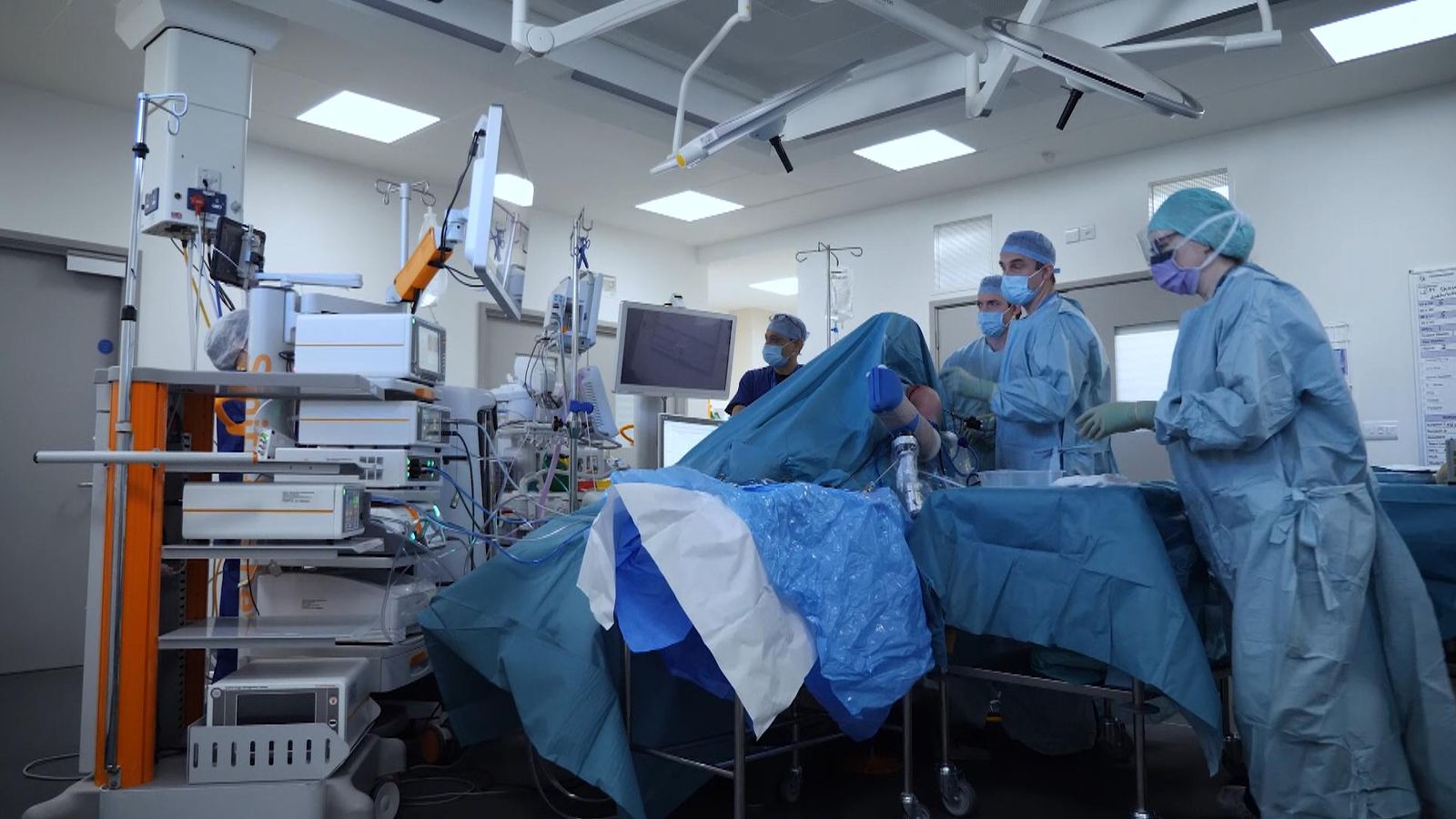Pradeep Gill can see very little of the intense activity around him. He is leaning back in a reclining chair inside one of Heatherwood Hospital’s operating theatres.
Buzzing around him is the operating team, led by consultant orthopaedic surgeon Jeremy Granville-Chapman.
For the surgeon and his team, this procedure is the very definition of routine. They have carried out more than 1,000 joint operations in the past 10 months.
Mr Gill is conscious but his body is covered by a gown.
His left arm, which is propped up on a hydraulic rest, has been made numb by a block, working the same way as a local anaesthetic.
Inside his shoulder is a camera that is sending back images to a large screen in the centre of the room above the patient. There is also an ablating tool being carefully guided by the surgeon.
The monitor shows Mr Granville-Chapman cutting through scarred tissue and clearing the inflammation that has left Mr Gill unable to move his arm since a fall in his garden in last August.
Three hours after his surgery in Ascot, Berkshire, Mr Gill’s bed is wheeled into the busy post-op recovery area.
“You’ve had surgery, here you are, and in a couple of hours you’ll be sent home, that must come as a real relief to you,” I asked Mr Gill.
“Yeah,” he replied. “You don’t realise how much you take things for granted with your mobility and being able to move your arms, how much it restricts you, so yeah, I’m glad.”
NHS tracker postcode search: See how your local trust is performing
Heatherwood Hospital, part of the Frimley Health NHS Foundation Trust, is busy. But it is a good-busy, not the bad-busy we have come to associate with the NHS during this winter crisis.
The modern building is bright and airy, mostly glass and exposed brickwork. There are lots of patients sitting around, sipping coffee and reading newspapers. And they all seem relaxed.
Please use Chrome browser for a more accessible video player
The site opened in March last year and Frimley’s hospital executives are keen to stress the impact it has made.
“As a specialist planned care facility, Heatherwood has been able to perform surgery six days a week with four out of its six state-of-the-art theatres dedicated to orthopaedic procedures,” it said in a press release.
“The hospital has also successfully reduced the length of time patients stay in hospital, with 40% of patients safely discharged within 24 hours.”
This is the practice the NHS wants to adopt as it battles a record seven-million-strong waiting list: specialist elective hubs where patients can come in for routine but life-changing surgery at a super-charged pace with theatres working at full tilt, six days a week.
Heatherwood can do that because the hospital is ring-fenced from acute pressures that affect other hospitals, as one its most senior orthopaedic surgeons, Mr Rakesh Kucheira, explained.
“We have now realised that winter pressures are 12 months not just three months, which means the acute sites are not going to be able to do planned activity that they planned for, so we’ve got to create more space,” he said.
“Is this going to be a model for the future,” I asked. “This is the model, we’re already looking, can we expand this unit, can we make two more theatres next year to take the pressure off?”
Read more:
‘Cautious optimism’ for NHS despite delays and cancellations, latest figures show
How NHS virtual wards mean acute patients are now being treated at home
NHS to treat 50,000 elderly and vulnerable patients in ‘virtual wards’ at home
According to the latest NHS data, the number of patients waiting more than 18 months has started to increase again.
In November 2022, it was 48,961 and has now increased to 54,882 patients waiting 18 months (78 weeks) or more in December 2022 for consultant-led hospital treatment.
The government’s elective recovery plan has a target to eliminate NHS waits of more than 18 months by April 2023.
Please use Chrome browser for a more accessible video player
The most common long waits seen were for trauma and orthopaedic treatment – such as hip and knee replacements (797,630), ear, nose and throat treatment (549,656), or general surgery – such as gallbladder removals and hernia operations (442,948).
Have you been affected by the strikes? To share your experience anonymously, please email [email protected]
As the NHS begins to ease out of the crippling winter pressure of the past few months, the impact of health worker strikes is being felt.
More than 41,000 hospital appointments were postponed this week due to the strikes.
All of these patients will need to be seen at some stage and if they require surgical procedures their numbers will swell the waiting list.
So while elective hubs like Heatherwood Hospital will have an impact, exactly how much will depend on problems across the wider NHS.









